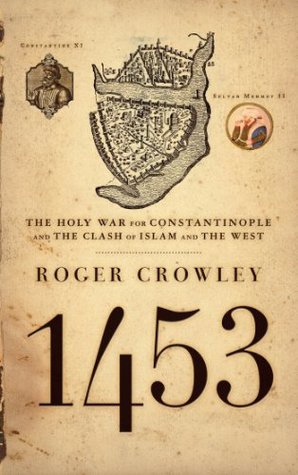More on this book
Community
Kindle Notes & Highlights
Read between
December 24 - December 28, 2019
The failure of Islam to take the city in 717 had far-reaching consequences. The collapse of Constantinople would have opened the way for a Muslim expansion into Europe that might have reshaped the whole future of the West; it remains one of the great “What ifs” of history. It blunted the first powerful onslaught of Islamic jihad that reached its high watermark fifteen years later at the other end of the Mediterranean when a Muslim force was defeated on the banks of the Loire, a mere 150 miles south of Paris.
Byzantium was not only the last heir to the Roman Empire, it was also the first Christian nation.
It was the beauty of the liturgy in St. Sophia that converted Russia to Orthodoxy after a fact-finding mission from Kiev in the tenth century experienced the service and reported back: “we knew not whether we were in Heaven or earth. For on earth there is no such splendour and beauty, and we are at a loss how to describe it. We only know that there God dwells among men.”
The detailed gorgeousness of Orthodoxy was the reversed image of the sparse purity of Islam.
“Sedentary people have become used to laziness and ease,” he wrote. “They find full assurance of safety in the walls that surround them, and the fortifications that protect them. The Bedouins have no gates and walls. They always carry weapons. They watch carefully all sides of the road. They take hurried naps only … when they are in the saddle. They pay attention to every faint barking and noise. Fortitude has become a character quality of theirs, and courage their nature.”
By the middle of the eleventh century a Turkish dynasty, the Seljuks, had emerged as sultans in Baghdad, and by its end the Islamic world, from Central Asia to Egypt, was largely ruled by Turks.
No one knows the true origins of these people, whom we now call Ottomans. They emerge from among the anonymous wandering Turkmen sometime around 1280, a caste of illiterate warriors living among tents and woodsmoke, who ruled from the saddle and signed with a thumbprint and whose history was subsequently reconstructed by imperial myth-making.
The laws of Islam required mercy to conquered peoples, and the Ottomans ruled their subjects with a light hand that seemed frequently preferable to European feudalism.
After 350 years the defeat at Varna extinguished the appetite in the West for crusading; never again would Christendom unite to try to drive the Muslims out of Europe.
“the Turkish Emperor storms and captures cities and also fortresses at great expense in order not to remain there long with the army.” Success depended on the ability to mobilize men and equipment quickly and on an impressive scale.
personal advancement and holy war, themes that were woven together in the Koran: by Islamic holy law, a city taken by force could be legitimately subjected to three days of plunder.
Mehmet’s policy had been to ensure that his enemies were divided;
Ship handling was a craft skill dependent on well-trained crews, so that the outcome of naval encounters rested less on numbers than on experience, determination, and the random luck of winds and currents.
No armored host could sustain a lengthy siege as effectively as the Ottomans. They understood the essential rules of camp life better than any Western army – the rapid burning of corpses, the protection of water sources, and the sanitary disposal of excrement were essential disciplines in Ottoman warfare – but gradually the mathematics of the siege were stacking against them. It has been estimated that in the Middle Ages a besieging army of 25,000 men, a third the size of that at Constantinople, must transport 9,000 gallons of water and 30 tons of fodder a day to provision itself. In a 60-day
...more
It was one of the psychological ploys of Ottoman conquest that it bound men into an effective reward system that linked honor and profit to the recognition of exceptional effort.
There is no certainty of victory in war, even when the equipment and numerical strength that cause victory exist. Victory and superiority in war come from luck and chance. Ibn Khaldun, fourteenth-century Arab historian
It was a stark contrast to the religious wars that fragmented Europe during the Reformation. The flow of refugees after the fall would be largely one way: from the Christian lands to the Ottoman Empire. Mehmet himself was more interested in building a world empire than in converting that world to Islam.
He is both a national brand, like Churchill – the name of a make of lorry, a bridge over the Bosphorus, the instantly recognizable image of a heroic galloping horseman on a commemorative stamp or a school building – and a symbol of piety.
What does exist is in the form of terse chronicles, later reworked to serve in the creation of an Ottoman dynastic legend, so that the Ottoman perspective often has to be constructed by reading between the lines of Christian accounts: 1453 is unusual in being history largely written by the losers.


